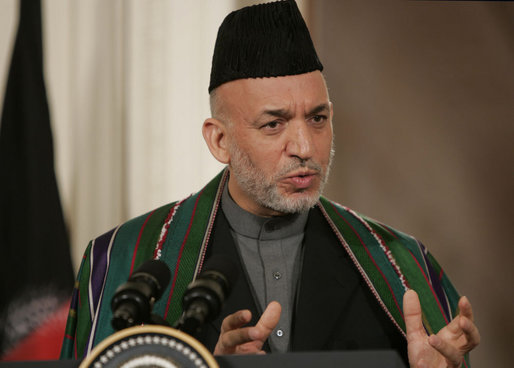Iran's Payoff To Afghanistan: Of Body Bags And Bags Of Cash
Iran’s "bags of cash" donations to its neighboring country of Afghanistan may seem like an outrage to some, but it is not outside the cultural practices of the region. Yes, it's a bribe, but it is also a mutual decision between two Shia countries to maintain good relations.

The idea of buying your way into a political alliance may seem unjust to Americans. But it is vital to note that many Western countries such as the United States and the United Kingdom have often engaged in the same practice, albeit in less egregiously public ways.
In 2001 the U.S. more or less appointed Hamid Karzai as the president of Afghanistan and for the last decade has picked up the tab of billions of dollars not only to bankroll his government but a widening war against the Taliban.
Maybe that's one way of understanding why Karzai wasn't hesitant to confirm that the cash has also been pouring in from Iran.
Apparently, the U.S. appropriates the bundles of cash through Congress. Iran just sends it in bags.
Iranian officials, of course, have denied the recent reports of so crudely funneling the money to Karzai.
White House spokesman Bill Burton said world leaders should have "every reason to be concerned about Iran trying to have a negative influence on Afghanistan."
Clearly, Washington is worried that an Iranian/U.S. duel in courting Afghanistan will allow Tehran to "appear reasonable on the international stage without making concessions on other thorny issues, like the nuclear weapons program."
But one should not jump to such facile conclusions. Iran has motives in Afghanistan that have nothing to do with its nuclear program nor with supporting international terrorism as the White House contends.
Few Americans realize that Iran is among regional states that most detest the Taliban. With 75 million Shia living inside its borders, Iran would have little to no reason to support the Sunni Taliban forces.
Dating back to an incident in 1998 when eleven Iranian officials were killed in Mazarsharif, Iran has maintained an aggressive posture against the Taliban. Indeed, Iran threatened military action against the Taliban, long before the U.S. did.
The difficult truth for many Americans to accept is that both Iran and the U.S. have shared interests in Afghanistan. Both countries, like much of the rest of the world, have a direct stake in a stable government in Kabul. Washington and Tehran may, in fact, have divergent policies but, nevertheless, have entertained goals when it comes to bolstering Karzai.
While the Obama administration has vehemently denied in engaging in similar practices of dumping cash in Kabul, other Western officials have a more realistic view.
"Many governments that hope to court influence are paying and providing money to the president's office in what I would call a slush fund. This has been going on since the very beginning, and the Americans are very much in the vanguard. So I'm not surprised the Iranians are doing it," said Francec Vendrell, the former EU envoy to Afghanistan.
The deeper problem, he said, was the failure of the West to establish a stable, non-corrupt government in Kabul.
It's unlikely that Iran is going to moderate its ongoing drive to purchase and maintain influence in Afghanistan. There are strong economic reasons for Iran to muscle Indian and Pakistan out of the Afghan market.
Within the past few years Iran has extended its electricity grid to the Afghan province of Herat, it has funded cooperative highway projects with India, and is planning to partner with NATO members on construction of an Iran-Afghanistan railway. Also, with a high percentages of Afghan refugees in Iran, Tehran has agreed to slow the process of deporting these illegal immigrants until its neighboring country sees greater socio-political stability.
Iran also has an indirect stake in the mutli-billion dollar Afghan opium market -- the biggest industry in Afghanistan. Poppy sales are a source of income for all factions in Afghanistan, including the Taliban. Iran would prefer that the Afghan government and not the insurgents control that revenue.
Washington can protest as much as it likes, but Iran has already rooted its influence much deeper in Afghanistan than almost anyone has expected. Citing just one example, the Afghan government took heed last year when Iran protested a $150 million Indian-funded dam project that Tehran claimed would damage its own flow of water.
Herein resides the irony of Washington's feigned shock that Iran is bribing or interfering with the government of Kabul. Like it or not, Washington and Tehran have a mutual interest in defeating the Taliban. The same Iranian theocratic interests that the U.S. fears and demonizes are fighting, in part, for the same goals of 100,000 American troops deployed in Afghanistan. The only difference between the way the U.S. and Iran are buoying the regime of Karzai is that the former makes donations in body bags and the latter in bags of cash.
Reach staff reporter Tara Kangarlou here.
Sign up for our weekly e-mail newsletter here.



